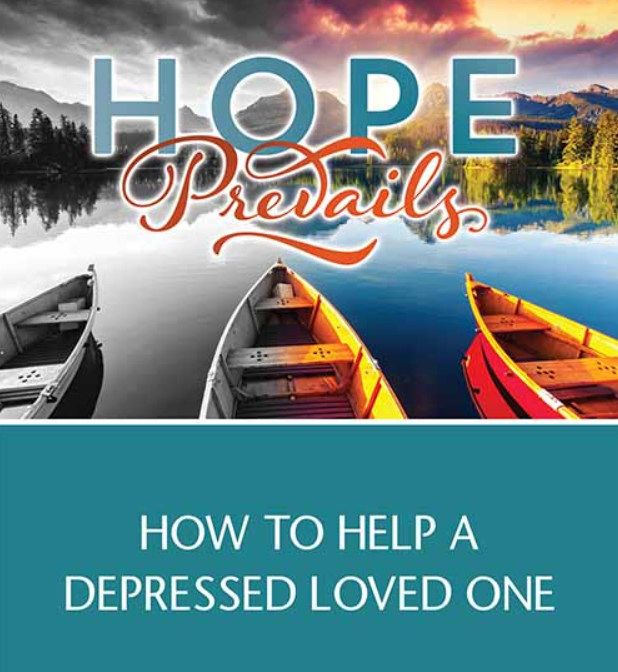We’re excited to welcome our personal friend Dr. Michelle Bengtson, to the blog today. Dr. B the author of the best-selling Hope Prevails: Insights From a Doctor’s Personal Journey Through Depression and the newly released companion Hope Prevails Bible Study.
“Honey, I don’t know what to say. I don’t know what to do to help…” my husband declared upon hearing my desperate condition.
If my life was going to be this painful and bleak, I wasn’t sure I wanted to continue enduring more of the same. And I told him so.
He was scared, and I was scared.
I just wanted someone to tell me everything was going to be all right, and for that to be the truth. He just wanted me to promise him that I was going to be all right, and yet I could make no promises at that point.
~~~
Depression.
It cuts to the core and shatters lives. Yet it can’t be seen from the outside and it’s often misunderstood.
Trying to adequately describe depression to someone else who has never had the misfortune to suffer its torment is like trying to describe a circus to a blind person. And yet, when we suffer in depression’s darkness, we rely on the love and compassion of friends and family to help traverse to the other side—the very ones who, although they try, may not understand.
As a friend, a loved one, a supporter of one who is depressed, you probably want to say the right thing or do the right thing, while being afraid of saying or doing something wrong and making matters worse.
May I offer you some encouragement in this regard, from someone who understands because I have over 25 years of clinical experience as a neuropsychologist, but also as someone who suffered and knows how it feels.
- Understand that depression is a medical condition. It’s classified as a “mental illness” because it is impacted by the neurotransmitters in the brain, but the brain is an organ just like the heart or the lungs. As such, someone suffering with depression can’t just “snap out of it” or “think positively” any more than they could “snap out of it” or “think positively” to cure their diabetes or epilepsy.
- Realize that while depression is a mental illness that affects our emotions, it has physical consequences as well. When most people think about depression, they think about someone with a sad mood, who cries, and perhaps stays in bed too much. But depression can impact a person physically too. It brings with it considerable fatigue, decreased energy, concentration difficulty, sleep and appetite changes, and sometimes even aches and pains. Little things like taking a shower or brushing teeth can feel like weighty, monumental tasks. Please adjust your expectations accordingly.
- Depression doesn’t fall along the normal continuum of emotions—it is outside the realm of what would be considered normal for the situation. It isn’t a case of the Sunday night blues, or reasonable frustration when things don’t go as planned. It’s far more serious—that’s why it’s categorized as an “illness.” As such, your loved one can’t be expected to “feel better in the morning.” It can take weeks or months or years to overcome, especially without adequate treatment.
- Nobody chooses to be depressed—it is a painful, debilitating condition. Yet sometimes the treatment to get well invokes fear in those who suffer. Research has shown that sometimes, we are motivated by fear to stay in our known misery rather than face the misery of the unknown—regardless of how good the ultimate outcome might be.
- Success is irrelevant—as tempting as it might be, let me suggest you resist the urge to try to encourage your loved one to think about all their successes and accomplishments to date, and be grateful for them. At any other time, I believe gratitude is a very important character trait. But when someone is depressed, encouraging them to remember “how good they have it” or “how far they’ve come” does nothing to minimize the suffocating pain they feel. I can almost guarantee they’d trade those successes in for a guaranteed life of peace and joy in a heartbeat.
- Comparison is the thief of joy—in your attempt to try to encourage and motivate your depressed loved one, please don’t compare their situation to how much worse someone else is suffering. It won’t make your loved one feel any better about their situation, nor will it lessen their darkness. It will only induce guilt and prompt frustration and anger, further intensifying the magnitude of their despair when they are now convinced you don’t understand or empathize with their pain.
- We just need to be heard. Depression can feel lonely and isolating, and even a bit frightening. While you might be worrying about having the right thing to say, we just want the opportunity to be together, to share, and to be heard without needing you to say anything or try to fix it. We don’t want to be anyone’s project. Sometimes we just need to be validated that we are still cared about and found worthy even when we don’t feel it.
When a loved one is navigating the pain of depression, your presence means more than perfect words. The gift of your presence lends strength when they feel weak. It offers togetherness and community when they feel scared and alone. It provides acceptance when they feel worthless and rejected. Don’t search for the perfect words, just be a sustaining presence and you will be remembered for your role in the journey to the other side of the dark valley.
For a Free eBook on How to Help a Depressed Loved One,
click here: http://drmichellebengtson.com/how-to-help-a-depressed-loved-one-ebook/
 Dr. Michelle Bengtson (PhD, Nova Southeastern University) is an author and international speaker. She has been a neuropsychologist for more than twenty years. She is in private practice in Southlake, Texas where she evaluates, diagnoses, and treats children and adults with a variety of medical and mental health disorders. She knows pain and despair firsthand and combines her professional expertise and personal experience with her faith to address issues surrounding medical and mental disorders, both for those who suffer and for those who care for them. She offers sound practical tools, affirms worth, and encourages faith. Dr. Bengtson offers hope as a key to unlock joy and relief—even in the middle of the storm. She and her husband of 30 years have two teenage sons, and reside in the Dallas/Ft. Worth area. She blogs regularly on her own site: http://www.DrMichelleBengtson.com
Dr. Michelle Bengtson (PhD, Nova Southeastern University) is an author and international speaker. She has been a neuropsychologist for more than twenty years. She is in private practice in Southlake, Texas where she evaluates, diagnoses, and treats children and adults with a variety of medical and mental health disorders. She knows pain and despair firsthand and combines her professional expertise and personal experience with her faith to address issues surrounding medical and mental disorders, both for those who suffer and for those who care for them. She offers sound practical tools, affirms worth, and encourages faith. Dr. Bengtson offers hope as a key to unlock joy and relief—even in the middle of the storm. She and her husband of 30 years have two teenage sons, and reside in the Dallas/Ft. Worth area. She blogs regularly on her own site: http://www.DrMichelleBengtson.com
Most everyone knows someone who is battling depression so we’d love for you to help us share this information with others. Thanks so much!










My friend Karla was suffering from depression and told no one of her current struggle and killed herself. It was at that point that I realized that we never know who is struggling, but with kindness and respect we might be able to make a difference. I tell my friends how I feel about them now. I’m more upfront about it now. I call new friends “friend” or “buddy” as soon as I sincerely can so that they know that someone cares about them and is available for them at any time. My hope is that by treating people as God’s special creation that they are edified and have hope.
Rachelle,
God has given you a sensitive spirit. We have to look for the good in others, look beyond the “I’m fine” to see the hurt, and be willing to be present. I’m so glad you care as deeply as you do. That is a gift to all who know you. #HopePrevails!